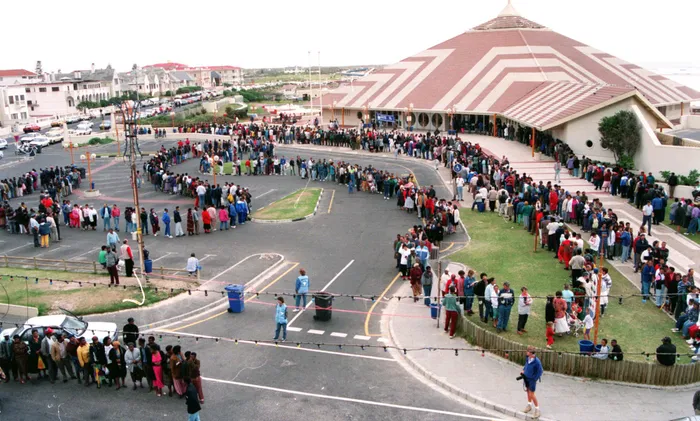Political opportunism, factionalism derails democracy project

People queue to vote at the Muizenberg Pavilion, in Cape Town, during the first democratic elections on April 27, 1994. The country was engulfed in euphoria and ecstasy. Thirty years later, we have reasons to celebrate our democracy, but the country is not where it is supposed to be, says the writer. – Picture: Hannes Thiart / Independent Newspaper
By Bheki Mngomezulu
This month marks 30 years since South Africa became a democratic country. With the benefit of hindsight, we can cast our eyes back to reflect on the road we have travelled since 1994.
It is impossible for everyone to see things through the same lens. South Africans belong to various political parties, have different religious convictions, reside in different geographical spaces and have been affected by democracy and freedom differently.
However, there is a point of convergence on certain achievements and failures.
As South Africa headed for its first democratic election on April 27, 1994, the country was engulfed in euphoria and ecstasy. This was to be expected. Many South Africans, especially black people, were going to vote for the very first time.
Conversely, white South Africans were anxious. For years, they had been deciding the fate of the country through elections. In 1983, they welcomed Indians and coloureds in what they called a Tricameral Parliament. This was a strategy by the apartheid government to divide non-whites, with the aim being to weaken and continue ruling them.
With the 1994 general election, there was optimism among the historically oppressed masses who envisioned a brighter future.
Some white South Africans were pessimistic. For this reason, many decided to emigrate. They did not believe that black people were capable of running the country.
Other whites were reminded about the sins they had committed against black people for many years, through the segregation policies up to 1947 and the oppressive apartheid laws from 1948 after the victory of the National Party under Dr DF Malan.
Against this backdrop, the two-pronged question which arises is the following: How far has South Africa come since 1994 and have we achieved the goals of freedom we envisioned in 1994?
As mentioned above, there is no single answer to the question. For us to answer it, we need a balanced account which considers the positive and negative developments in the country over the past 30 years.
On the positive front, we can enumerate a couple of achievements.
First, the adoption of the Interim Constitution, in 1993, was a move in the right direction. It meant that for the first time, South Africa was going to have a constitution that accommodated everyone. The draft constitution was revised and adopted in 1996 as Act 108.
Importantly, the impact of the Constitution was that South Africa was re-admitted into the global community and ceased to be perceived as the pariah state – a label it had earned under apartheid.
Second, chapter nine institutions were created to assist in the consolidation of democracy. We can look back with a sigh of relief that some of the institutions have done a great job in opening new avenues that did not exist under apartheid.
Third, through the Government of National Unity, South Africa demonstrated that political tolerance, which did not exist before the 1994 general election, was possible. Although the GNU was short-lived, it brought a glimmer of hope.
Fourth, service delivery took a different direction. Services such as water and electricity reached many rural areas that had only dreamt of them under apartheid. Road construction also expanded to previously neglected areas of the country.
Fifth, attempts were made to realise some of the goals envisioned in the Freedom Charter, which was adopted in 1955 in Kliptown, Soweto.
Education was made more accessible and the school curriculum was revised, albeit with some challenges.
The positive developments led to the conclusion that not everything was doom and gloom.
As South Africans, we are justified in celebrating 30 years of democracy based on our achievements. But it is equally true that the country is not where it should have been. There are many things that have gone wrong since 1994.
First, policy implementation, monitoring and evaluation have been lagging. This means that the many achievements and progress the country could have registered cannot be accounted for. The pace for change has been too slow.
Second, political greed by the political leadership has derailed prospects for the country’s upward mobility. Instead of serving communities, some have enriched themselves and those close to them.
The political phrase “lootocracy” has applied as politicians looted the state’s resources for personal gain.
Third, while it is true that some services have been extended to rural areas, the government has not done enough to develop rural areas.
The consequence of the failure is that many people from rural areas have flocked to the cities in search of jobs and to access better services.
The increase in crime, filth and other social ills is caused by this neglect of rural areas.
Fourth, one of the main concerns raised by the African people was getting their land back. This is yet to happen. Even when the ANC obtained the two-thirds majority required to amend the Constitution under then-president Thabo Mbeki, it failed dismally to do so. This is an indictment on the ANC.
Last, factionalism within the ANC has robbed the country of meaningful progress. Instead of propelling the country to success, the ANC has been nursing factional politics.
Therefore, we have reasons to celebrate 30 years of democracy but South Africa is not where it is supposed to be.
Prof Bheki Mngomezulu is Director of the Centre for the Advancement of Non-Racialism and Democracy (CANRAD) at the Nelson Mandela University